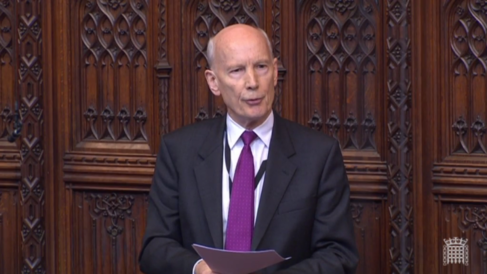
Head of CSIC, Professor Lord Robert Mair, drew attention to the need for and benefits of innovation in a speech at the House of Lords during a debate about the Report from the Economic Affairs Committee Rethinking High Speed 2 (6th Report, Session 2017-19, HL Paper 359) this month.
Drawing attention to the three principal areas of concern for HS2 as stated in the Report, including priorities for rail investment, the process used to evaluate the project and cost reduction considerations, Lord Mair acknowledged the need for additional rail capacity in the UK and the legally binding commitment to deliver net-zero emissions by 2050. He said: “HS2 and the associated improved transport network will provide the much-needed additional rail capacity for the country, encouraging a shift from road to rail. The considerably improved rail network will contribute to a significant reduction in CO2 emissions by discouraging car use and putting more freight on rail.”
Citing the HS2 Chairman’s Stocktake, by the chairman of HS2, Allan Cook, made public in September 2019, Lord Mair said: “It makes the very important point that HS2 is an integral part of the plans of Transport for the North, Northern Powerhouse Rail and Midlands Connect. It highlights that HS2 will provide 50% of the lines needed by Northern Powerhouse Rail.” He pointed out the recommended areas of further work identified in the Stocktake included “developing further cost efficiencies including challenging standards and specifications,” which he addressed with reference to the Industrial Strategy Construction Sector Deal’s three key strategic themes aimed at transforming the construction industry, improving productivity and reducing costs: digital; off-site manufacturing; and performance.
Lord Mair said: “Innovative sensor technologies, combined with data analytics, can lead to significant cost savings. The current practice has been to rely on overly conservative, overly robust designs to ensure against any uncertainty and provide safeguards against any potential problems throughout the future design life. However, much of this current practice is now out of date. Construction is one of the few engineering sectors in which, over the years, there have been very few advances and improvements in standards and specifications. It is a particularly conservative industry. This can now change. The opportunities for much smarter and more economic construction now exist.”
Highlighting the potential of installing sensors in critical parts of new infrastructure such as HS2, Lord Mair said: “There are opportunities for significantly more economic designs. Data generated by sensors now enables continuous monitoring of the infrastructure throughout its operational life. This provides information for more rational maintenance and repair strategies: a concrete slab may not need to be as thick; piles may not need to be as long; cut slopes may not need to be as shallow.”
Calling for full adoption of these key parts of the Industrial Strategy’s Construction Sector Deal across UK infrastructure and stressing the significant economies HS2 could secure, Lord Mair concluded: “More take-up of innovative sensor technologies, data analytics and artificial intelligence is needed for HS2. These can certainly lead to significant economies. With smart and innovative engineering, there is still considerable scope for cost reduction for HS2.” The Government announced its approval for the HS2 high-speed train line to go ahead in a speech to the House of Commons on 11 February.
Read the full debate here.
